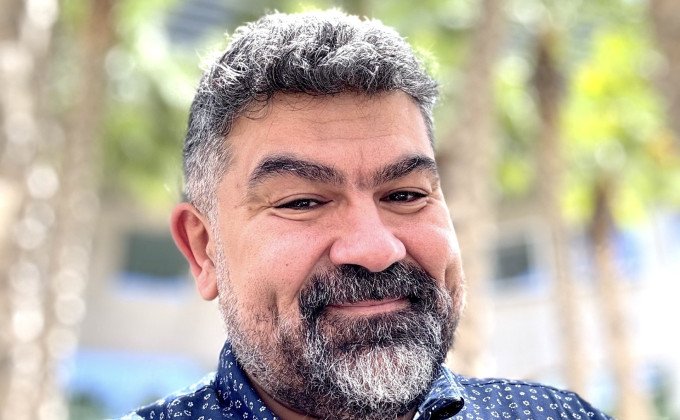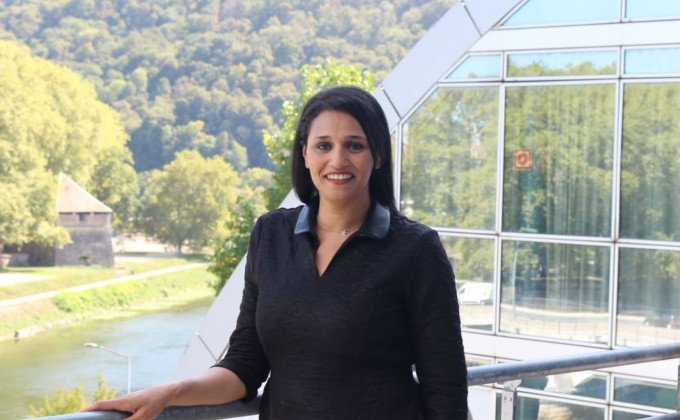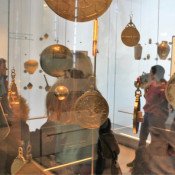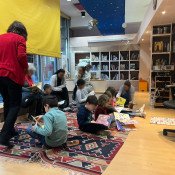
قياس وتقييم وذكاء صنعي: مئات الاحتمالات الواعدة
مقابلة مع ليلى فاميليار
مقابلة مع الدكتورة ليلى فاميليار، خبيرة في تعليم الّلغة العربية. ستشارك ليلى فاميليار في المدرسة الخريفيّة لتعليم اللّغة العربيّة الّتي ينظّمها مركز اللّغة والحضارة العربية لمعهد العالم العربي بين 21 و25 أكتوبر 2024.
(English version below)
(Version française plus bas)
الدكتورة ليلى فاميليار أستاذة في جامعة نيويورك أبو ظبي ومستشارة أكاديمية متخصصة في مجال تعليم اللغة العربية كلغة إضافية. تمتدّ خبرتها لخمسة وعشرين عاماً في تدريس اللغتين العربية والإسبانية في العالم العربي والولايات المتحدة الأمريكية. صدر لها قاموس المفردات الأكثر شيوعاً في الرواية العربية المعاصرة، إضافة إلى مناهج لتعليم اللغة العربية تعتمد على الأدب المعاصر. وقد نالت جائزة التميّز في تدريس اللغات من جامعة تكساس في أوستن. تحرص الدكتورة ليلى على المشاركة الدورية في المؤتمرات الأكاديمية، كما تقدّم دورات تدريبية لمعلّمي اللغة العربية.
لا فائدة من تعليم اللغة إنْ لم نكن قادرين على تصميم مهمّات وأنشطة تضع المتعلّم في سياقات متنوعة تحفّزه على إنتاج عيّنات لغوية تحاكي الواقع
ما هي الصّعوبات والتّحدّيات الّتي واجهتها (أو واجهها المعلمون عمومًا) في إدخال الذكاء الصنعي على تعليم اللغة العربية، خصوصًا لغير الناطقين بها؟
يواجه المعلمون في الواقع العملي تحديات متعددة، لعلّ أبرزها ضيق الوقت المُتاح لتعلّم تقنيات الذكاء الصنعي، فأغلب المعلمين منهمكين في مهام متعددة تستنزف من وقتهم وجهدهم. الحلّ الأمثل بهذا الشأن يكمن في توفير الدعم الإداري اللازم كي يستثمر المعلم جزءاً من وقته في التطوير المهني.
بالنسبة لمجال تعليم اللغة العربية تحديداً هناك تحدّ إضافي وهو أنّ أغلب التطبيقات والبرامج المُتاحة لا تعمل بالكفاءة و"الذكاء" الذين نشهدهما في الإنجليزية مثلاً. ونأمل أن يُسهم العلماء والخبراء العرب في تطوير هذه الأدوات أو ابتكار غيرها من أجل سدّ الفجوة مع اللغات الأخرى بالسرعة اللازمة، حتى لا نجد أنفسنا في آخر الركب كما حدث عندما ظهرَ كمبيوتر آبل (الماك) وانتظرنا سنين طويلة قبل أن نتمكّن من الطباعة بالحروف العربية عليه.
عملت طويلًا في مجال قياس اللغة خصوصًا في الولايات المتحدة. ما هي أهمية اعتماد القياس والتقييم أيضًا في اللغة العربية؟
القياس والتقييم جزءان لا يتجزّءان من تعليم وتعلّم اللغة العربية. في المؤسسات التعليمية، يمثّل التقييم (assessment) مجموعة الأساليب التي نجمع من خلالها الأدلّة على تقدّم الطالب ومدى تحقيقه للأهداف اللغوية التي يضعها البرنامج. لا فائدة من تعليم اللغة إنْ لم نكن قادرين على تصميم مهمّات وأنشطة تضع المتعلّم في سياقات متنوعة تحفّزه على إنتاج عيّنات لغوية تحاكي الواقع.
أمّا القياس (measurement) فيأتي دوره لاحقاً، ويتم غالباً من خلال امتحانات يعدّها المعلّم في إطار صف اللغة العربية، أو اختبارات تصمّمها مؤسسات معروفة بالتعاون مع خبراء مختصين بهدف منح شهادات كفاءة مُعتمدة. هذه الاختبارات تتّبع معايير متفّق عليها مُسبقاً (مثل الإطار المرجعي الأوروبي المشترك – كما هو الحال مع اختبار "سمة") وتكتسب أهمية كُبرى لدى لفئات معيّنة من الموظّفين الذين يحتاجون إثبات كفاءاتهم اللغوية (سواء الإنتاجية والاستيعابية) للحصول على وظيفة وأدائها على الوجه الأمثل.
مع التطوّر المتسارع للذكاء الصنعي، أتوقع انتشار هذا النوع من الاختبارات في مجال اللغة العربية. وفي المستقبل القريب أتوقّع أن نشهد اختبارات لغوية متطوّرة، حيث يقوم الحاسوب بتوليد نصوص مكتوبة ومسموعة أثناء الاختبار مصمّمة خصيصاً لتتماشى مع مستوى الممتحَن وأدائه اللحظي
برأيك، هل الذكاء الصنعي مهم في مجال القياس والتقييم؟ كيف ترين مستقبلهما سويًًا؟
بكل تأكيد. يعدّ الذكاء الصنعي جزءاً من أدوات القياس منذ سنوات عديدة، فقد استُخدم في تطوير اختبارات تتكيّف مع القدرات اللغوية التي يُظهرها المُمتحَن أثناء أدائه للاختبار، وهو ما يُسمّى بـ"الاختبار التكيّفي المحَوْسَب" (Computerized Adaptive Testing). تتميّز هذه الخاصية بتقليل وقت الاختبار (ممّا يخفّف من إرهاق الممتحَن) وزيادة دقة النتائج. مع التطوّر المتسارع للذكاء الصنعي، أتوقع انتشار هذا النوع من الاختبارات في مجال اللغة العربية. وفي المستقبل القريب أتوقّع أن نشهد اختبارات لغوية متطوّرة، حيث يقوم الحاسوب بتوليد نصوص مكتوبة ومسموعة أثناء الاختبار مصمّمة خصيصاً لتتماشى مع مستوى الممتحَن وأدائه اللحظي.
أمّا بالنسبة للتقييم داخل صفوف اللغة العربية، فالذكاء الصنعي سيلعب دوراً حيويّا في ابتكار طرق ومواد جديدة أكثر إبداعاً لإشراك الطلاب وتحفيزهم على ممارسة اللغة. ونظراً لأن مجال تعليم اللغة العربية لم يشهد تطوراً كبيراً في العقود الأخيرة، نأمل أن يكون الذكاء الصنعي بمثابة محرّك قوي لدفع عجلة التطوير في هذا الاتجاه.
كيف تنظرين لمثل هذه اللّقاءات التي ينتوي معهد العالم العربي أن يقيمها في باريس خلال الخريف؟
أنا شخصياً أتطلّع بشغف إلى المشاركة في المدرسة الخريفية لأنها فرصة للتعرّف على زملاء جدد والاستفادة من تجاربهم في هذا المجال الذي يجمعنا، ألا وهو تعليم اللغة العربية. نأمل أن تثمر هذه التجربة عن شراكات ومشاريع تعاونية تسهم في الارتقاء بهذا الميدان.
AI, Measurement and Assessment; how do they come together?
Interview with Laila Familiar, expert in language teaching. Laila will be a speaker at the Autumn School of the IMA Language Centre dedicated to the didactics of the Arabic language. The Autumn School will be held from 21 to 25 October 2024.
Doctor Laila Familiar currently teaches at NYU Abu Dhabi and is an academic consultant specialized in teaching Arabic as a foreign language. Her expertise in teaching both Arabic and Spanish in the Arab world and the United States spans over 25 years. She has published the most popular dictionary in the contemporary Arabic field and Arabic language curricula based on contemporary literature. Doctor Laila Familiar has also received the Teaching Excellence Award from the University of Texas, Austin. She participates periodically in academic conferences and offers training courses for Arabic language teachers.
There is no use in teaching a language if we can’t engineer tasks and activities that put the student in contexts that motivate him to produce language samples that mimic reality.
What are the challenges and difficulties you (and other teachers in general) have faced while introducing AI (artificial intelligence) to Arabic teaching, especially to non-speakers?
Teachers face many challenges on a practical level, notably the limited time dedicated to learning how to use AI technologies. Most teachers are occupied by other tasks that take up a lot of their time and effort. The ideal solution would be to provide enough administrative support for teachers to invest some of their time in their professional development.
Regarding the Arabic teaching field, there is also another challenge we face; most of the available apps and programs aren’t as efficient and "smart" as in English for example. We hope that Arab scientists and experts will contribute to the development and innovation of these tools in order to close the gap we have in Arabic compared to other languages, so we do not find ourselves missing the boat, which already happened with Apple's computer (Mac); we waited years before being able to type in Arabic.
You have worked in the measurement and assessment fields for a long time. What is the importance of measurement and assessment in Arabic language teaching?
Measurement and assessment are two integral parts of teaching and learning Arabic. In teaching institutions, assessment represents the methods through which we gather proof of the student’s progress and how many linguistic objectives were reached. There is no use in teaching a language if we can’t engineer tasks and activities that put the student in contexts that motivate him to produce language samples that mimic reality.
Measurement comes after assessment; it is usually done through exams prepared by the teacher in Arabic class or through tests engineered and designed by known institutions in collaboration with experts. These tests aim is to certify candidates, which is why they conform to existant norms and references (like the CEFR – Common European Framework of Reference for Languages – the case of CIMA, the International Certificate for Arabic Language Proficiency). This kind of certification is usually popular amongst some professionals who need to prove their linguistic competence (whether productive or assimilative) to get a job.
AI will play a vital role in devising new and more creative ways and materials to engage and motivate students to practice the language. Since the field of Arabic language teaching has not developed significantly in recent decades, we hope that AI will serve as a powerful tool to drive us in the direction of further development.
In your opinion, is AI important in measurement and assessment? How do you see their future together?
Without any doubt. AI has been a tool for assessment for many years. It has been used to develop tests that adapt to the language abilities shown by candidates during examinations. This is what we call Computerized Adaptive Testing. This technique shortens the time of the test (which lessens the exhaustion of the examinee) and makes results more precise. I expect this kind of test to become more common in the Arabic language field, especially with the evolution of AI. I also expect to see sophisticated language tests, where the computer generates written and audible texts that are tailored to the examinee’s level and real-time performance during the test.
As for evaluation within Arabic language classes, AI will play a vital role in devising new and more creative ways and materials to engage and motivate students to practice the language. Since the field of Arabic language teaching has not developed significantly in recent decades, we hope that AI will serve as a powerful tool to drive us in the direction of further development.
What do you think of the meeting that the Arab World Institute intends to hold in Paris in October?
I am personally looking forward to contributing to the Autumn school because it is an opportunity to meet new colleagues and benefit from their experiences in the field that brings us all together. I hope this experience will result in collaborative partnerships and projects that will contribute to the advancement of the Arabic language field.
L'intelligence artificielle au service de la certification et de l'évaluation
Entretien avec Laila Familiar, spécialiste en enseignement de la langue arabe. Laila sera l'une des conférencières de la 2e édition de l’Ecole d’automne du Centre de langue de l’IMA dédiée à la didactique de la langue arabe, qui se tiendra du 21 au 25 octobre 2024.
Laila Familiar enseigne actuellement à NYU Abu Dhabi ; elle est également consultante universitaire, spécialiste en arabe langue étrangère. Riche de vingt-cinq ans d'expertise dans l’enseignement de l’arabe – mais aussi de l’espagnol – dans le monde arabe et aux États-Unis, elle a publié un dictionnaire de renom et des manuels d'apprentissage de la langue arabe basés sur la littérature contemporaine. Elle a reçu le prix d’excellence en enseignement de l’Université du Texas (Austin).
il est inutile d’enseigner une langue si cela ne va pas de pair avec des exercices et autres activités plaçant l’étudiant dans différents contextes de situations réelles.
Quels défis vous-même – et les enseignants en général –, avez-vous dû relever, et quelles difficultés avez-vous rencontrées, confrontée à l’introduction de l’intelligence artificielle (IA) dans l’enseignement de l’arabe, en particulier aux non-natifs ?
Les défis sont nombreux au plan pratique, notamment du fait du temps limité que le corps enseignant peut consacrer à l’apprentissage de l’utilisation de l’IA. La plupart des enseignants sont occupés par d’autres tâches ardues et chronophages. La solution idéale serait de leur apporter un soutien administratif suffisant pour qu’ils puissent investir une partie de leur temps dans la formation professionnelle.
Concernant spécifiquement l’enseignement de la langue arabe, nous sommes confrontés à une autre difficulté : la plupart des applications et des programmes disponibles ne sont pas aussi efficaces et « intelligents » en arabe qu'en anglais, par exemple. Nous espérons que les scientifiques et experts arabes contribueront au développement et à l’innovation de ces outils afin de combler l’écart entre l’arabe et les autres langues. Il ne faudrait pas que nous prenions du retard comme cela s’est produit lorsque l’ordinateur d’Apple (Mac) est apparu et que nous dû attendre des années avant de pouvoir disposer d’une version en langue arabe.
Vous avez longtemps travaillé dans le domaine de la certification et de l’évaluation. Quelle place occupent ces deux domaines dans l’enseignement de la langue arabe ?
La certification et l’évaluation font partie intégrante de l’enseignement et de l’apprentissage de l’arabe. Dans les établissements d’enseignement, les méthodes d’évaluation permettent d’attester des progrès de l’apprenant et du nombre d’objectifs linguistiques atteints – il est inutile d’enseigner une langue si cela ne va pas de pair avec des exercices et autres activités plaçant l’étudiant dans différents contextes de situations réelles.
La certification vient après l’évaluation ; elle est généralement réalisée par le biais d’examens préparés par l’enseignant et passés en classe, ou à travers des tests conçus par des institutions de renom en collaboration avec des experts. Ces tests visant à certifier les candidats, ils obéissent à des normes et références existantes (ainsi, le Certificat international de maitrise en langue arabe [CIMA] obéit aux normes du Cadre européen commun de référence pour les langues [CECRL]).
L’IA est appelée à jouer un rôle essentiel dans la conception de moyens et de matériaux novateurs et créatifs pour engager et motiver les élèves à pratiquer la langue. L’enseignement de l’arabe ne s’étant pas significativement développé au cours des dernières décennies ; espérons que l’IA se révélera un puissant outil concourant à ce développement.
L’IA occupe-t-elle une place importante dans la certification et l’évaluation ?
Sans aucun doute ! L’IA est un outil d’évaluation depuis de nombreuses années. Elle a été utilisée pour développer des tests qui s’adaptent aux compétences linguistiques démontrées par les candidats lors des examens. C’est ce que nous appelons le « test adaptatif informatisé ». Cette technique permet de réduire la durée du test (et limite du même coup le risque de fatigue) tout en fournissant des résultats plus précis. Je m’attends à ce que ce genre de test devienne plus courant dans le domaine de la langue arabe, en particulier avec l’évolution de l’IA. Et, dans un proche avenir, à voir apparaître des tests de langue sophistiqués, dans lesquels l’ordinateur génère au fil du test des textes écrits et audios adaptés au niveau du candidat.
Concernant l’évaluation pendant les cours de langue arabe, l’IA est appelée à jouer un rôle essentiel dans la conception de moyens et de matériaux novateurs et créatifs pour engager et motiver les élèves à pratiquer la langue. L’enseignement de l’arabe ne s’étant pas significativement développé au cours des dernières décennies ; espérons que l’IA se révélera un puissant outil concourant à ce développement.
Comment envisagez-vous la prochaine École d’automne organisée par l’IMA en octobre prochain ?
Je suis personnellement impatiente à l’idée de contribuer à cette 2e édition de l’École d’automne : ce sera l’occasion de rencontrer de nouveaux collègues et de bénéficier de leurs expériences dans un domaine qui nous rassemble tous. J’espère que cette expérience aboutira à des partenariats et à des projets collaboratifs qui contribueront à faire avancer l’enseignement de la langue arabe.










